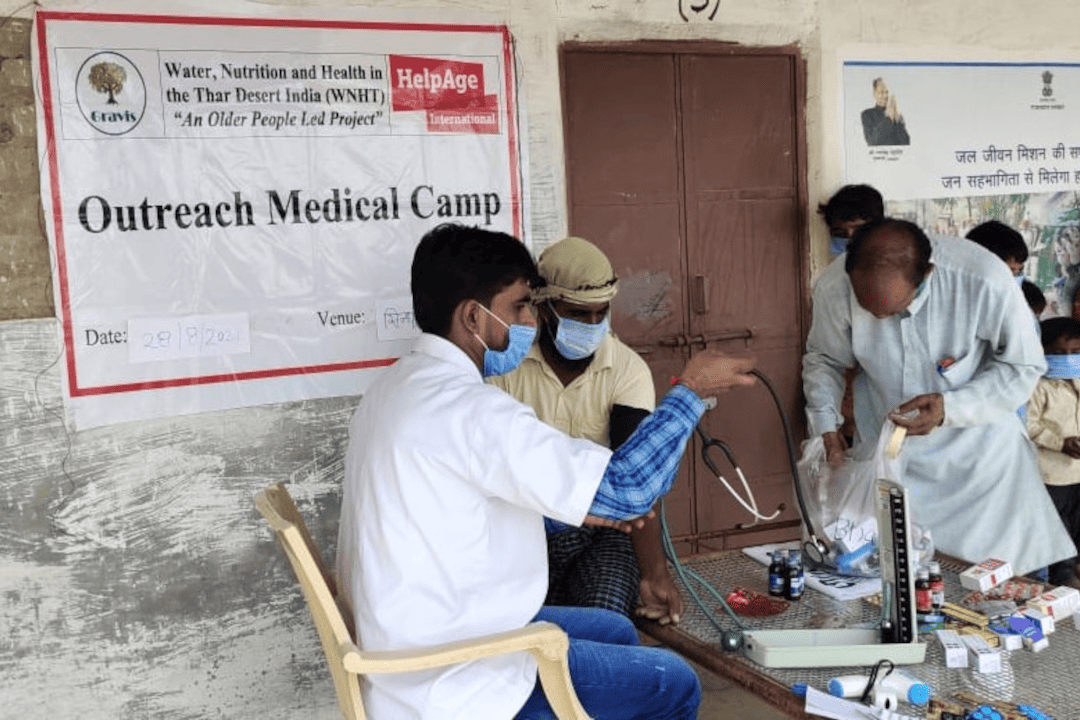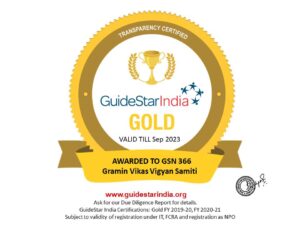Health
The Thar is a region adversely impacted by recurrent droughts and acute water shortage. Access to quality and affordable healthcare is almost non-existent with insufficient nutrition, lack of basic vaccination services and appalling personal hygiene conditions being major challenges for the inhabitants. Poor socio-economic status of women and girls combined with pre-dominant social evils are responsible for widespread neglect of their health resulting in high rates of pregnancy at a young age, high miscarriage and infant mortality rates, risk of mortality and morbidity during labour as well as prevalence of infectious and chronic diseases in them.
In addition, older people have been significantly affected by the lack of health services and their understanding of health seeking behaviors. Conditions like glaucoma and diseases such as tuberculosis are widely- spread, however there are no facilities where these can be detected and treated promptly. GRAVIS meets the healthcare needs of the local people on several levels, ranging from surgeries in our hospital, field based medical health camps to training VHWs. Since our first healthcare programme in late 1980s, we have expanded our area of impact to isolated villages and administered healthcare to thousands.
In addition, older people have been significantly affected by the lack of health services and their understanding of health seeking behaviors. Conditions like glaucoma and diseases such as tuberculosis are widely- spread, however there are no facilities where these can be detected and treated promptly. GRAVIS meets the healthcare needs of the local people on several levels, ranging from surgeries in our hospital, field based medical health camps to training VHWs. Since our first healthcare programme in late 1980s, we have expanded our area of impact to isolated villages and administered healthcare to thousands.
GRAVIS Hospital

Established in the year 2000, GRAVIS Hospital is one of the very few healthcare facilities serving communities in the rural areas of Thar. Fully equipped with well trained staff including 5 medical doctors supported by 25 other personnel managing the administrative, technical and ambulatory departments, the hospital has become a crucial supplier of professional healthcare to more than 2,50,000 people inhabiting the region. GRAVIS’ field based medical programmes function to identify and link patients in need with the hospital for major and minor surgeries (orthopaedical and intestinal), to treat diseases such as malaria and conditions like malnutrition and anaemia as well as supervise pregnancies including ante-natal and post-natal check-ups.
Training of VHWs

The VHWs provide an essential link between the villagers and GRAVIS, all of whom work and live in rural areas in the Thar. Because more than 90% are women, they can best understand the apprehensions and condition of the local people. Their primary role is to provide first aid, assist with safe childbirth practices, recognize diseases, refer patients to a doctor/hospital when necessary and promote overall health and hygiene in the village.
To aid the VHWs in their efforts, GRAVIS runs frequent training programmes on various health related subjects including sanitation, family planning, nutrition and diet, child care, menstrual health, social issues affecting public health, prevention and treatment of common diseases, risky health behavior and preventive measures. The VHWs are also provided with a kit filled with equipment necessary to complete their tasks.
To aid the VHWs in their efforts, GRAVIS runs frequent training programmes on various health related subjects including sanitation, family planning, nutrition and diet, child care, menstrual health, social issues affecting public health, prevention and treatment of common diseases, risky health behavior and preventive measures. The VHWs are also provided with a kit filled with equipment necessary to complete their tasks.
Outreach Medical Camps

Field based medical camps are organized to address the immediate medical needs of patients who live in remote areas and are unable to access healthcare facilities and have no means of transportation to reach those. Apart from treating infections and prescribing medicines our doctors also refer patients to GRAVIS hospital and other nearby medical facilities.

Eye Care

Unprotected exposure to the harmful UV light for long hours and a general prevalence of malnutrition gives rise to a wide range of eye problems including glaucoma, cataract and numerous other eye infections. Our eye screening camps are particularly designed to treat these concerns. If need be, patients are also transferred to the hospital for surgeries.
Child Care, Maternal Health, Geriatric Health

GRAVIS’ health programmes are designed to meet diverse needs of all age groups. This is ensured by training the community representatives and providing special medical care and advice to the ones who need. Our creche programme is a day care for infants and young children where health check-ups, pre-school education and nutritious meals are provided. Young children in our medical camps are subject to regular immunization.
Adolescent boys and girls are trained and informed about the changes they will undergo during puberty, importance of menstrual hygiene, personal hygiene and sanitation. Mothers and mothers-to-be are given necessary support and advice at ante-natal and post-natal stages while linking them to respective health institutions and midwives.
We also raise awareness to educate the elderly on healthcare and nutrition needed at an advanced stage and link them to age friendly, easily accessible and affordable health programmes, also known as Self Care Trainings. In addition, GRAVIS provides all forms of primary medical care to older people both at its hospital and within the community through mobile medical services.
We also raise awareness to educate the elderly on healthcare and nutrition needed at an advanced stage and link them to age friendly, easily accessible and affordable health programmes, also known as Self Care Trainings. In addition, GRAVIS provides all forms of primary medical care to older people both at its hospital and within the community through mobile medical services.

Mineworkers' Health

Rajasthan is home to thousands of mines. The region is world famous for its marble and sandstone and mining is a very common occupation, second only to agriculture. Small farmers and agricultural labourers who are solely dependent on rainfed agriculture often turn to the nearest sandstone quarry after the monsoon crop is harvested and during the drought years to earn a living. This is how mining becomes a primary source of income for many. However, while the mining industry serves as a steady occupational alternative to farming it comes with occupational hazards which are life threatening. Workers are forced to endure ten hours of strenuous labor in the open sun without appropriate safety gear for a meager paycheck. Underpaid, overworked with unhealthy living and working conditions, mine workers become victims of diseases like silicosis and tuberculosis.
GRAVIS has been working for the entitlements of mine workers for a long time. Our wide range of interventions include curative and diagnostic health services, educating the mining community on occupational health hazards and safety, formal education for mine workers’ children, support to women through SHGs and advocacy efforts focused on safe mining practices with various stakeholders.
GRAVIS has been working for the entitlements of mine workers for a long time. Our wide range of interventions include curative and diagnostic health services, educating the mining community on occupational health hazards and safety, formal education for mine workers’ children, support to women through SHGs and advocacy efforts focused on safe mining practices with various stakeholders.
Infectious Diseases

Malaria is one of the most wide-spread and lethal infections in the Thar Desert transmitted by infected mosquitoes that thrive in the stagnant water, for example in naadis. In cases of epidemic hitting the region, GRAVIS provides short- term relief action by treating infected patients. As a preventive measure, GRAVIS tries to reduce the risk of infection by adding trapdoors to the taankas, built close to people’s homes.
HIV/AIDS is spreading in India with rates relatively low in Rajasthan. Since talking about this disease is still a social taboo, many myths and misapprehensions about the transmission of HIV/AIDS exist. In order to reduce the risk of infection due to lack of knowledge, GRAVIS conducts workshops and meetings to achieve thorough understanding of this disease. Tuberculosis is another significant challenge in Thar. GRAVIS has been addressing TB in the region by raising awareness in the communities and disseminating DOTS treatment in the remotest of villages in partnership with the Government.
HIV/AIDS is spreading in India with rates relatively low in Rajasthan. Since talking about this disease is still a social taboo, many myths and misapprehensions about the transmission of HIV/AIDS exist. In order to reduce the risk of infection due to lack of knowledge, GRAVIS conducts workshops and meetings to achieve thorough understanding of this disease. Tuberculosis is another significant challenge in Thar. GRAVIS has been addressing TB in the region by raising awareness in the communities and disseminating DOTS treatment in the remotest of villages in partnership with the Government.

